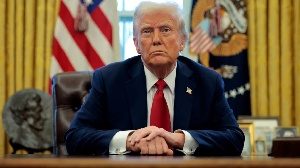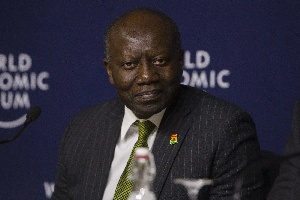- Home - Entertainment
- Lifestyle News
- Year In Review
- Music News
- Entertainers
- Entertainment Archive
- Entertainment Photos
- Jokes
- Entertainment Headlines
- Ameyaw Debrah
- Brown GH
- Celebrities Buzz
- GH Base
- Ghana Celebrities
- Gh Gossip
- GH Page
- GH Splash
- Hot Gossip GH
- YEN
Television of Thursday, 3 April 2025
Source: www.ghanawebbers.com
Trump announces new tarrifs, Ghana hit by 10% import tax
U.S. President Donald Trump has announced new tariffs. These include a 34% tax on imports from China and a 20% tax on goods from the European Union. This move signals rising global trade tensions.
Ghana will also be affected, facing a 10% import tax.
Speaking from the Rose Garden, Trump declared a national economic emergency. He justified the tariffs as a way to boost domestic manufacturing. He claimed foreign nations have exploited the U.S. economy for decades.
"Our country has been looted and plundered by other nations," Trump said. "Taxpayers have been ripped off for more than 50 years."
The tariffs were introduced without Congressional approval under the International Emergency Powers Act of 1977. They target countries with significant trade surpluses with the U.S. Ghana and other affected nations will face a 10% import tax, increasing pressure on global supply chains.
**Economic Fallout and Recession Fears**
The announcement caused a sharp sell-off in U.S. stock markets. Investors are worried about an economic slowdown ahead. Analysts predict rising prices for essential goods like housing, cars, and clothing.
Economists fear these tariffs could lead to a global recession. Olu Sonola of Fitch Ratings warned that average U.S. tariff rates may rise significantly by 2024.
"Many countries will likely fall into recession," Sonola cautioned. "If these tariff levels stay long-term, forecasts will need major revisions."
**Comparisons to the Great Depression**
Critics compare this situation to the Smoot-Hawley Tariff Act of 1930. That act worsened the Great Depression by starting a global trade war.
Scott Lincicome and Colin Grabow from the Cato Institute warn Trump's policies could have similar effects.
"With today’s announcement, U.S. tariffs will reach levels not seen since Smoot-Hawley," they noted.
**Global Backlash and Retaliatory Measures**
Trump's new tariffs will impact key trading partners worldwide, except Canada and Mexico due to USMCA agreements. China faces additional penalties: along with the 34% tariff, it incurs a 20% penalty for fentanyl production.
The European Union and other affected countries, including Ghana, are expected to retaliate with their own tariffs.
Despite potential backlash, Trump insists these measures will generate billions in revenue and restore fairness in trade.
Republican lawmakers from agricultural and border states have expressed concerns over this strategy's long-term effects on Ghana and other developing nations reliant on U.S. trade for stability.











